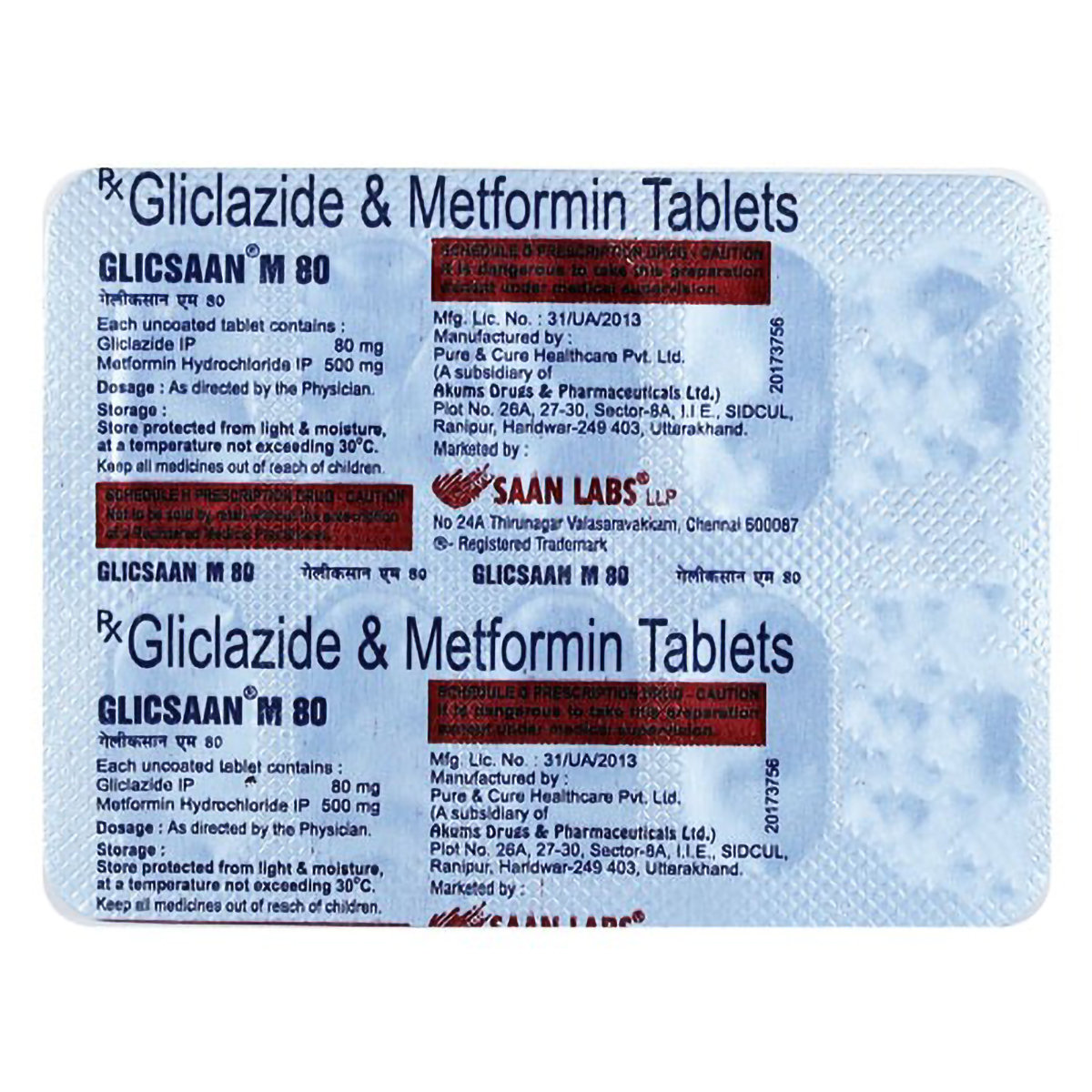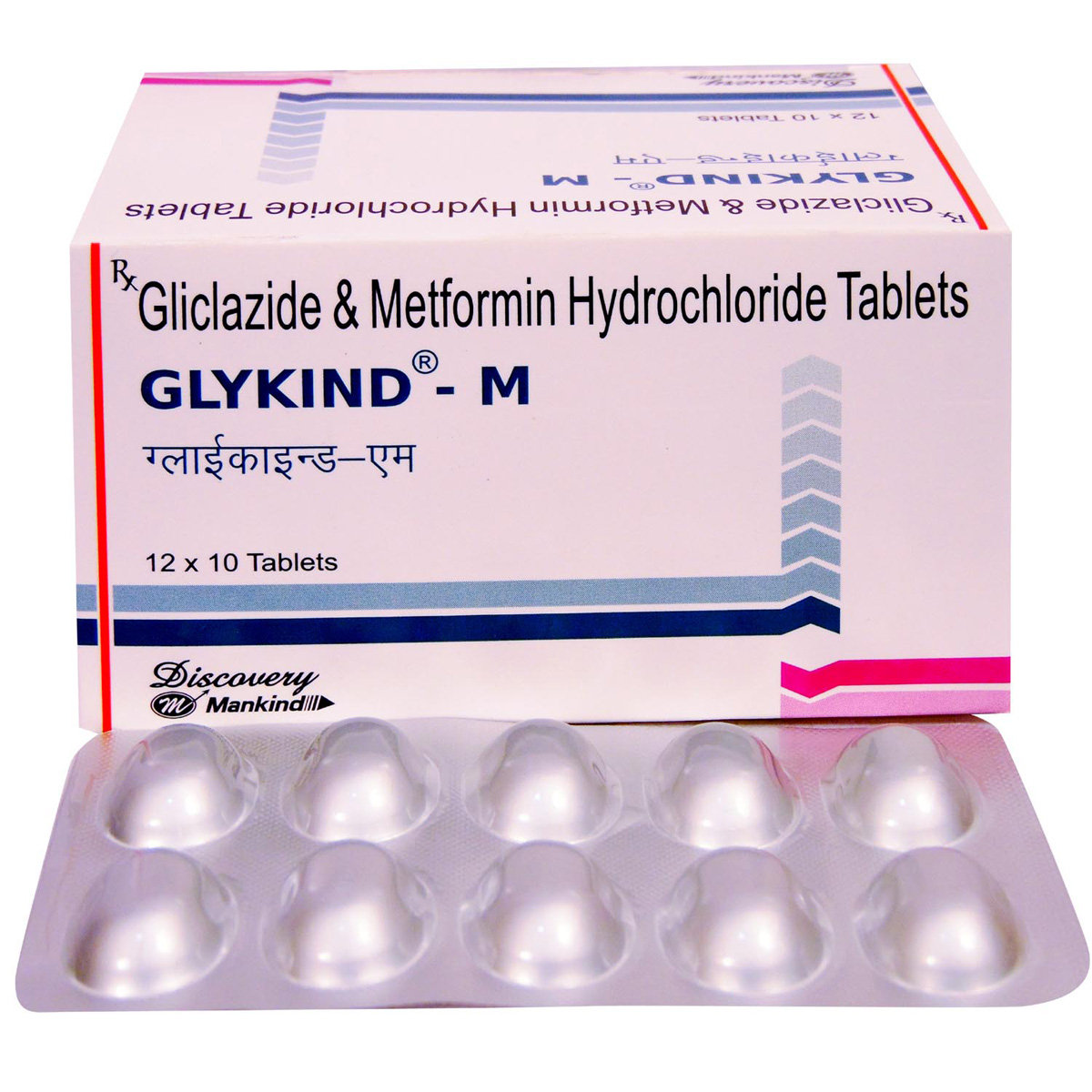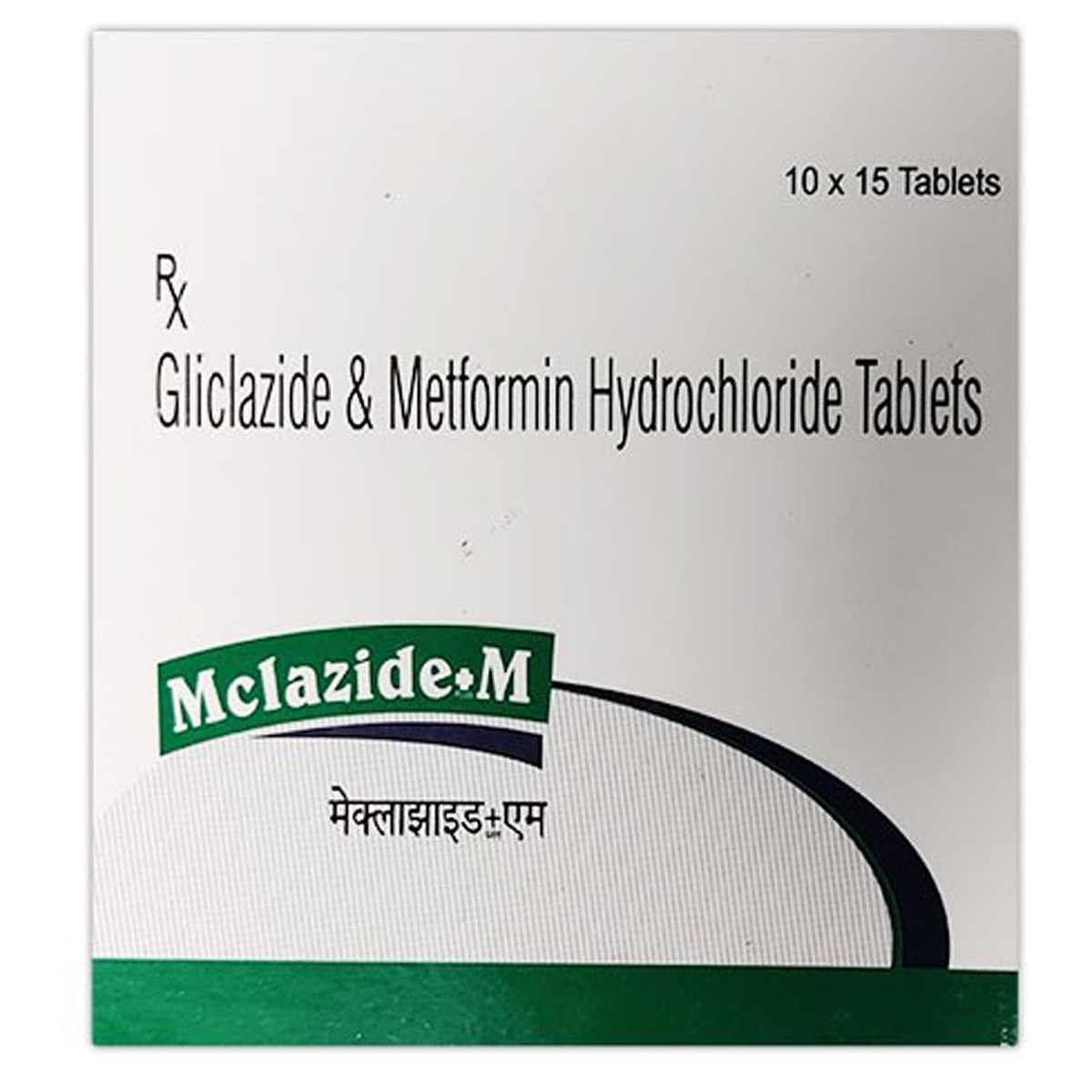Oclazid M 80mg/500mg Tablet

MRP ₹39
(Inclusive of all Taxes)
₹5.8 Cashback (15%)
Oclazid M 80mg/500mg Tablet is used to treat Type 2 diabetes. It contains Gliclazide and Metformin, which acts by increasing the amount of insulin released by the pancreas. Also, it lowers the glucose production in the liver, delaying glucose absorption from the intestines and increasing the body's response to insulin. It shows optimum effects when taken along with healthy lifestyle changes like weight loss, regular exercise, a healthy diet etc. A common side effect of this medicine is hypoglycaemia (low blood glucose levels) characterized by dizziness, sweating, palpitations, hunger pangs, dry mouth and skin etc. So, to avoid hypoglycaemia, you should not miss meals and also should carry some form of sugar along with you. Other side effects include taste change, nausea, diarrhoea, stomach pain, headache, and upper respiratory symptoms.
Know Your Delivery Time
Provide Delivery Location

Secure Payment

India's Most Trusted Pharmacy

Genuine Products
Composition :
Consume Type :
Return Policy :
Expires on or after :
About Oclazid M 80mg/500mg Tablet
Oclazid M 80mg/500mg Tablet is used to treat type 2 diabetes mellitus. Type 2 diabetes develops when the body does not produce enough insulin or when your body's insulin does not work as well as it should. It can also develop if the body produces too much glucagon.
Oclazid M 80mg/500mg Tablet is a combination of Gliclazide and Metformin. This medicine works by increasing the amount of insulin released by the pancreas and thus results in decreased blood sugar levels in the body. It also works by lowering the glucose production in the liver, delaying glucose absorption from the intestines and increasing the body's response to insulin.
Not everyone who is taking Oclazid M 80mg/500mg Tablet will get these side effects. In some cases, you may experience certain common side effects, such as stomach ache or indigestion, nausea, vomiting, and constipation. Most of these side effects do not require medical attention and resolve gradually over time. However, please consult your doctor if you experience these side effects persistently.
Oclazid M 80mg/500mg Tablet should be taken with food to avoid an upset stomach. It is advised to take it at the same time each day for best results. For better advice, your doctor will determine the appropriate dose, which can change quickly depending on your condition. Do not skip your meals, and also carry a form of sugar with you to prevent low blood sugar levels.
Do not take Oclazid M 80mg/500mg Tablet if you are allergic to any of its components, or if you have diabetic ketoacidosis (excess acids in your blood). Oclazid M 80mg/500mg Tablet should not be stopped even if you feel better without consulting your doctor, as sugar levels may change. Consult the doctor if you are pregnant or planning to get pregnant or breastfeeding. Avoid alcohol consumption while taking Oclazid M 80mg/500mg Tablet, as it might increase the side effects (hypoglycemia).
Uses of Oclazid M 80mg/500mg Tablet
Oclazid M 80mg/500mg Tablet is used in the treatment of Type 2 diabetes mellitus. The detailed uses of Oclazid M 80mg/500mg Tablet are as follows:
- Diabetes Management: Oclazid M 80mg/500mg Tablet is frequently prescribed to manage blood sugar levels in individuals with type 2 diabetes.
- Cardiovascular Health: By enhancing blood sugar control, Oclazid M 80mg/500mg Tablet contributes to better cardiovascular health and reduces the risk of heart disease in diabetic patients.
- Improving Energy Levels: Stabilising blood sugar levels with Oclazid M 80mg/500mg Tablet helps boost energy levels and supports overall well-being in those managing diabetes.

Have a query?
Directions for Use
- Oclazid M 80mg/500mg Tablet should be taken with food to avoid stomach upset.
- It is usually taken twice daily at the same time each day or as prescribed by your doctor.
- Swallow Oclazid M 80mg/500mg Tablet as a whole with a glass of water.
- Do not chew, crush, or break it.
Medicinal Benefits
- Oclazid M 80mg/500mg Tablet plays a vital role in decreasing the blood sugar level in the body as metformin lowers glucose production in the liver, whereas the other increases the amount of insulin released by the pancreas.
- Oclazid M 80mg/500mg Tablet also helps to prevent serious complications of diabetes such as kidney damage (diabetic nephropathy), blindness (diabetic retinopathy), loss of sensation in your hands and feet (diabetic neuropathy) or even loss of the foot.
- Oclazid M 80mg/500mg Tablet also helps to reduce your chance of having a heart attack or stroke.
- Being a combination of two drugs, it reduces the need to take multiple pills and hence makes it easier to remember to take the drugs.
- The strict control of blood sugars is especially important to mention the many disabling side effects of diabetes.
- Oclazid M 80mg/500mg Tablet shows optimum effects when taken along with healthy lifestyle changes like weight loss, regular exercise, a healthy diet, etc.
How Oclazid M 80mg/500mg Tablet Works
Storage
What if I have taken an overdose of Oclazid M 80mg/500mg Tablet
Drug Warnings
- Do not take Oclazid M 80mg/500mg Tablet if you are allergic to any of its components. Also this medicine is not recommended in conditions like type 1 diabetes, diabetic pre-coma or coma, severe liver or kidney disease.
- Inform the doctor if you have/had any medical history of heart, liver, and kidney diseases, glucose-6-phosphate dehydrogenase (G6PD) deficiency (abnormality of red blood cells), and hemolytic anemia.
- Oclazid M 80mg/500mg Tablet, when used with insulin, may extremely lower the blood sugar level, leading to a hypoglycemic condition, which can be fatal.
- Inform your doctor if you are pregnant, planning for a pregnancy or breastfeeding before starting the treatment.
- Oclazid M 80mg/500mg Tablet may lower vitamin B12 levels, so try to have annual blood tests and vitamin tests.
- Oclazid M 80mg/500mg Tablet may lower your thyroid-stimulating hormone (TSH), so an annual check-up of TSH is suggested.
- Avoid drinking alcohol while on this drug as it increases the risk of hypoglycemia (decrease in blood sugar which might be fatal in some cases) and lactic acidosis (when the lactic acid increases in the body, which impacts the functioning of various organs in the body).
- Be alert for signs of low blood sugar (hypoglycemia), such as sweating, dizziness, dry mouth, dry skin, fast heartbeat, shivering, intense thirst, or frequent urination.
Drug-Drug Interactions
Drug-Drug Interactions
Login/Sign Up
Co-administration of Iodixanol with Oclazid M 80mg/500mg Tablet can increase the risk of side effects.
How to manage the interaction:
Taking Oclazid M 80mg/500mg Tablet with Iodixanol is not recommended, please consult a doctor before taking it. Do not discontinue the medications without consulting a doctor.
Co-administration of Iopamidol with Oclazid M 80mg/500mg Tablet can increase the risk of side effects.
How to manage the interaction:
Taking Oclazid M 80mg/500mg Tablet with Iopamidol is not recommended, please consult a doctor before taking it. Do not discontinue the medications without consulting a doctor.
Co-administration of Oclazid M 80mg/500mg Tablet and Iobitridol can increase the risk of lactic acidosis (when the body produces too much lactic acid).
How to manage the interaction:
Taking Oclazid M 80mg/500mg Tablet with Iobitridol is generally avoided as it can result in an interaction. Please consult your doctor before taking it.
Co-administration of Oclazid M 80mg/500mg Tablet and Iocetamic acid can increase the risk of lactic acidosis (when the body produces too much lactic acid).
How to manage the interaction:
Taking Oclazid M 80mg/500mg Tablet with Iocetamic acid is generally avoided as it can result in an interaction, please consult your doctor before taking it.
Co-administration of Iotroxic acid with Oclazid M 80mg/500mg Tablet can increase the risk of side effects.
How to manage the interaction:
Taking Oclazid M 80mg/500mg Tablet with Iotroxic acid is not recommended, please consult your doctor before taking it.
Co-administration of Iofendylate with Oclazid M 80mg/500mg Tablet can increase the risk of side effects.
How to manage the interaction:
Taking Oclazid M 80mg/500mg Tablet with Iofendylate is generally avoided as it can result in an interaction, please consult your doctor before taking it.
Co-administration of Oclazid M 80mg/500mg Tablet and Iobenzamic acid can increase the risk of lactic acidosis (when the body produces too much lactic acid).
How to manage the interaction:
Taking Oclazid M 80mg/500mg Tablet with Iobenzamic acid is generally avoided as it can result in an interaction, please consult your doctor before taking it.
Co-administration of Iopromide with Oclazid M 80mg/500mg Tablet can increase the risk of lactic acidosis.
How to manage the interaction:
Taking Iopromide with Oclazid M 80mg/500mg Tablet is not recommended, please consult a doctor before taking it. Do not discontinue the medication without consulting a doctor.
Co-administration of Ioversol with Oclazid M 80mg/500mg Tablet can increase the risk of side effects.
How to manage the interaction:
Taking Oclazid M 80mg/500mg Tablet with Ioversol is not recommended, please consult your doctor before taking it.
Co-administration of Iomeprol with Oclazid M 80mg/500mg Tablet can increase the risk of side effects.
How to manage the interaction:
Taking Oclazid M 80mg/500mg Tablet with Iomeprol is not recommended, please consult a doctor before taking it. Do not discontinue the medications without consulting a doctor.
Drug-Food Interactions
Drug-Food Interactions
Login/Sign Up
Diet & Lifestyle Advise
- Fill your half plate with starchy veggies, a quarter with proteins, and a quarter with whole grain.
- Eat at regular intervals. Do not take the long gap between a meal or snack.
- Monitor your blood sugar level regularly, especially when there are a lot of fluctuations.
- Invest at least 150 minutes of moderate-intensity physical activity and 15 minutes of high-intensity exercise weekly.
- Lose weight gradually to achieve a healthy body mass index (18.5 to 24.9).
- Replace refined carbohydrates-containing foods with whole grain foods and increase intake of fruits, veggies, and other fibre-enriched foods.
- Reduce saturated fat intake (or hidden fats) in food like chips, crisps, pastries, biscuits and samosas. Choose omega-3 fatty acid-containing oils for daily cooking. For frying, you may use palm oil, mustard oil, groundnut oil, rice bran oil, and safflower oil.
- Do not take stress as it may elevate your blood sugar level. You may adopt stress management techniques like mindfulness, yoga or meditation to control pressure related to blood sugar changes.
- Opt for low-fat dairy products (low-fat yoghurt, fat-free milk and cheese etc.).
- Keep your blood pressure as normal (120/80) as possible as it reduces the risk of cardiovascular diseases in diabetes patients.
Habit Forming
Therapeutic Class
All Substitutes & Brand Comparisons
RX
Glicsaan M 80mg/500mg Tablet 10's
Saan Labs
₹76.5
(₹6.89 per unit)
96% COSTLIERRX
Glykind-M Tablet 10's
Mankind Pharma Pvt Ltd
₹84
(₹7.56 per unit)
115% COSTLIERRX
Mclazide Plus M Tablet 15's
Mitoch Pharma Pvt Ltd
₹130
(₹7.8 per unit)
122% COSTLIER
Alcohol
Unsafe
You are recommended not to consume alcohol along with Oclazid M 80mg/500mg Tablet to avoid unpleasant side-effects.
Pregnancy
Caution
Please consult the doctor. There are no adequate and well-controlled studies on pregnant women. Your doctor will prescribe only if the benefits outweigh the risks.
Breast Feeding
Caution
Let your doctor know if you are a nursing mother before taking Oclazid M 80mg/500mg Tablet; your doctor will decide whether Oclazid M 80mg/500mg Tablet can be taken by breastfeeding mothers or not.
Driving
Caution
Oclazid M 80mg/500mg Tablet may cause hypoglycaemia (low blood sugar levels), whose symptoms include unusual sleepiness, shivering, palpitations, sweating etc. This may affect your ability to drive. Use caution while driving or doing anything that requires concentration.
Liver
Caution
Tell your doctor before prescribing the Oclazid M 80mg/500mg Tablet if you have a history of liver disease. Your doctor may adjust your dose depending upon your current liver conditions.
Kidney
Caution
Tell your doctor before receiving the Oclazid M 80mg/500mg Tablet if you have a history of kidney disease. Your doctor may adjust your dose depending upon your current kidney conditions.
Children
Unsafe
The safety and efficacy of Oclazid M 80mg/500mg Tablet in children have not been established. Oclazid M 80mg/500mg Tablet is not recommended in children.
Heart
Please consult your physician if you have any heart-related problems before taking Oclazid M 80mg/500mg Tablet.
Geriatrics
Consult your doctor
Your doctor will recommend Oclazid M 80mg/500mg Tablet if needed in the geriatric population. Please consult your doctor.
FAQs
Oclazid M 80mg/500mg Tablet is used to treat Type 2 diabetes.
Oclazid M 80mg/500mg Tablet is a combination of two anti-diabetic drugs: Gliclazide and‚ Metformin. Gliclazide works by increasing the amount of insulin released by the pancreas. On the other hand, Metformin works by lowering the glucose production in the liver, delaying glucose absorption from the intestines and increasing the body's response to insulin. In a nutshell, the two medicines prevent blood glucose levels from rising to very high levels, thus keeping your diabetes under control.
Hypoglycemia refers to low blood sugar levels and it is one of the side effects of Oclazid M 80mg/500mg Tablet. Hypoglycemia can occur if you miss or delay your food, drink alcohol, over-exercise or take other antidiabetic medicine along with this medicine. It is important to regularly monitor blood sugar levels.
No, Oclazid M 80mg/500mg Tablet should not be used with other anti-diabetic medications as it may cause hypoglycemia (lowering of blood sugar level).
If you feel thirsty after taking Oclazid M 80mg/500mg Tablet, it may be because of dehydration as Oclazid M 80mg/500mg Tablet can lead to loss of fluids. Increase intake of fluids, if even then you feel thirsty please consult your doctor.
Yes, long-term usage of Oclazid M 80mg/500mg Tablet can cause vitamin B12 deficiency as it interferes with the absorption of vitamin B12 in the stomach. The symptoms of vitamin B12 deficiency include fatigue, nerve problems, tingling sensation and numbness in hands and feet, weakness, urinary problems, affect mental status, and difficulty in maintaining balance. These symptoms can be managed by taking Vitamin B12 supplements as advised by your doctor.
If you have symptoms like increased hunger, increased thirst, frequent urination (usually at night), unexplained weight loss, fatigue, blurred vision, slow wound/sores healing, and frequent infections, contact doctor as it can be a condition of type 2 diabetes.
In case you feel that your blood sugar level is going down and you are feeling weak, immediately eat sugar candies or drink sugary beverages. It will help to balance the blood sugar level in your body. So, it is advisable to keep sugar candies with you.
Type-2 diabetes generally does not affect healthy children and teens, but it may affect children who are obese, which is also known as Childhood Obesity.
Include a diet rich in fruits, vegetables and whole grains like brown rice, whole wheat, oats, barley, and quinoa. Non-fat or low-fat dairy and proteins like chicken, lean meats, nuts, beans, tofu, lentils, eggs, fish, and turkey can also be included.
Cut back on foods high in sodium, alcohol, fried foods, and high-carb food and drinks like sugary drinks, drinks with added sugar, white rice and starchy vegetables.
Hypoglycaemia (low blood sugar) may occur because you inject too much insulin, miss or delay meals, do not eat enough, eat food containing less carbohydrate than normal, drink alcohol, lose carbohydrates due to vomiting or diarrhoea, do more exercise than usual or a different type of physical activity, are recovering from an injury, illness, operation or stress, or are taking/have stopped taking other medicines.
Oclazid M 80mg/500mg Tablet is an anti-diabetic medicine used to treat type-2 diabetes.
Possible side effects of Oclazid M 80mg/500mg Tablet are low blood sugar, taste change, nausea, diarrhoea, stomach pain, headache, and upper respiratory symptoms. Consult the doctor if the side effects persist or worsen.
Oclazid M 80mg/500mg Tablet can cause lactic acidosis, a rare, but serious, metabolic complication. Consult the doctor if you notice symptoms of lactic acidosis like abdominal pain, vomiting, muscle cramps, difficulty breathing, reduced body temperature and heartbeat, and severe tiredness.
Oclazid M 80mg/500mg Tablet should not be taken by people who are allergic to any of its components, people having severe kidney disease or diabetic ketoacidosis.
No, it is not safe to drink alcohol while taking Oclazid M 80mg/500mg Tablet as it might cause low blood sugar and unpleasant side effects.
Oclazid M 80mg/500mg Tablet should be taken during pregnancy and breastfeeding only if prescribed by the doctor.
Oclazid M 80mg/500mg Tablet may not be recommended for children as the safety and efficacy have not been established. Please consult the doctor.
Overdose may cause hypoglycaemia (low blood sugar). Seek medical attention if you have overdosed on Oclazid M 80mg/500mg Tablet.
Country of origin
Disclaimer
Author Details
We provide you with authentic, trustworthy and relevant information








